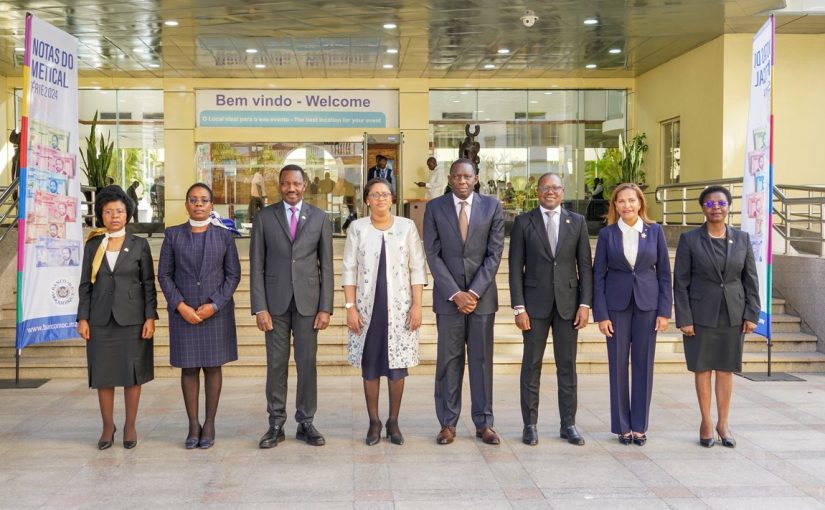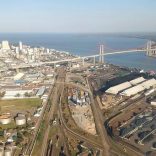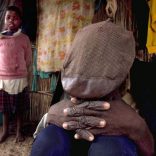Mozambique's international bond tumbles on Thursday
Mozambique: Economic situation ‘challenging’ – finance minister

Photo: Banco de Moçambique
Mozambique’s Finance Minister Carla Loveira said on Monday that the country’s economic and financial scenario remains “challenging,” acknowledging the impact of post-election social tension in the first quarter of the year.
Speaking at an event at the Bank of Mozambique in Maputo yesterday, the minister recalled that “in recent years” the country’s macroeconomic management has addressed “challenges arising from external and internal shocks that deeply affect” the economy, such as terrorism in Cabo Delgado, extreme weather events and “violent demonstrations” following the general elections on 9 October.
These culminated in the “destruction of public and private infrastructure, which led to a slowdown in the economy, with growth at 1.9% compared to the 5.5% projected in the PESOE [Economic and Social Plan and State Budget] for that year. Carla Loveira added, “This situation became clear in the first quarter of 2025, with GDP showing a 3.9% change compared to the same period in 2024, reflecting changes in the secondary sector of 16.2% and in the tertiary sector of 8%.”
“This shows that the context remains demanding, and parliament approved the PESOE for 2025 in this framework (…) [which] points to fiscal consolidation as the primary objective for balancing the State’s accounts.” In this context, the minister also stressed, “We approved policy measures to increase efficiency in revenue collection, stabilise the level of public debt concerning the wage bill, to reduce the primary deficit and create space for productive investment.”
The Mozambican economy experienced a 3.92% year-on-year slowdown in the first quarter, following a 5.73% decline in the last three months of 2024, Mozambique’s National Statistics Institute (INE) announced on 10 June.
In its quarterly national accounts report for the first three months of 2025 – a period still marked by strong post-election social unrest in the country – the INE explained this performance “primarily” with the secondary sector, which fell by 16.18%.
Mozambique’s Gross Domestic Product (GDP) grew by 3.56% in the first quarter of 2024, followed by further increases of 4.28% and 5.53% in the second and third quarters, respectively. For 2025, the government forecasts growth of 2.9%.
Following the events that followed the general elections on 9 October, GDP fell by 5.73% in the last quarter and 3.92% in the first quarter of 2025, according to INE.
Mozambique experienced almost five months of social tension, marked by demonstrations, strikes, and barricades in the streets of several cities, especially Maputo. Supporters initially protested the election results of 9 October, a mobilisation called by former presidential candidate Venâncio Mondlane.
The protests degenerated into violence with the police and resulted in around 400 deaths, as well as the destruction and looting of public infrastructure and businesses.
On 23 March, Daniel Chapo and Venâncio Mondlane, the presidential candidate who seeks to verify the results of the October general elections, met for the first time and committed to ending the violence. They met again on 21 May with an agenda to pacify the country.
The Confederation of Economic Associations of Mozambique (CTA) presented its February estimates, which indicate that post-election demonstrations affected nearly a thousand Mozambican companies, resulting in an economic impact of 32.2 billion meticais (approximately €480 million) and leaving 17,000 people unemployed.
The CTA survey shows that demonstrations and social unrest that followed the October general elections “directly affected” 955 companies, with 51% “experiencing total vandalism and/or looting of their goods”.
A Ministra das Finanças, Carla Loveira, dirigiu na manhã desta segunda-feira (16), no Centro Internacional de Conferências Joaquim Chissano, a abertura das XVI Jornadas Científicas do Banco de Moçambique.
Leia mais em https://t.co/jk6epUccKd#JornadasCientíficas #BM50anos pic.twitter.com/ejBwl0zXEu— Banco de Moçambique (@bancomoc) June 16, 2025












Leave a Reply
Be the First to Comment!
You must be logged in to post a comment.
You must be logged in to post a comment.